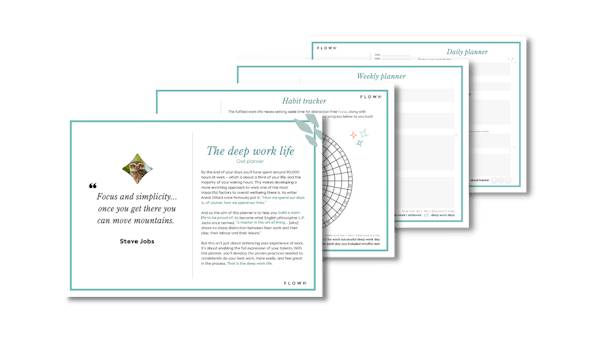Procrastination: Why do I do it and how to overcome it
We all struggle with procrastination from time to time. Understanding more about it can help us develop the skills to overcome it.

In this guide, we’ll explore why you might be struggling with procrastination, and ways to get started on tasks you’re avoiding. We’ll also dive into different types of procrastination, why it’s nothing to do with laziness and tools that can be used to kick the habit for good.
What exactly is procrastination?
Procrastination is the act of avoiding, delaying or ignoring a task you need to do. You’re aware of the negative consequences, but the short-term benefits of doing something else – or the short-term pain of actually doing the thing – stop you doing it.
You’re not alone: according to a recent (2022) white paper by The Policy Institute, King's College London, half the public are prone to checking their smartphones to procrastinate. This tallies with a 2001 study that reported similar findings, whilst more recent research reveals the rate of chronic procrastination has risen to 75% among college students.
Why do I procrastinate?
People may have told you you’re ‘lazy’ or not very good at ‘time management’, but at its heart procrastination isn't a laziness problem, it's an emotional regulation problem.
Procrastination is an attempt to regulate emotions like boredom, stress, fear and self-doubt. If starting a difficult task fills you with negative, self-critical thoughts, then avoiding the task will feel safer.
But in the long run, this increases negative feelings. Emotional avoidance might give you temporary relief, but it's followed by increased frustration, which leads to more procrastination.
We call it the ‘procrastination cycle’.
Other things can exacerbate procrastination like:
Abstract goals
An abstract goal is when the thing you want to do is badly defined, and unclear in your mind. You know what you ultimately want to achieve, but not what you need to do right now.
For example, sitting down at your desk with the intention of 'writing your dissertation’ without a plan. You’re more likely to procrastinate because it's not clear exactly what you have to do.
No immediate reward for your present self
Human beings are immediate creatures. If an outcome is far in the future, we'll struggle to value it in the moment.
The Stanford marshmallow experiment explores this by offering a child one marshmallow now or two if they wait. Children under four struggle to pass the test, as they prefer to reward their present selves over their future self.
Adults also prioritise their present selves.
If your task has no immediate reward, like a sense of achievement when you reach your daily word count, then you’re more likely to procrastinate.
Being overwhelmed
If you have lots of tasks on your plate, or one enormous one, you’re more likely to procrastinate.
We become overwhelmed when lots of things happen at once, even tasks we’d easily be able to complete one by one. Being overwhelmed can make us stick our heads in the sand to avoid mountains of work we don't know how to prioritize.
Low self-efficacy
Self-efficacy is an individual's belief in their ability to achieve something. It’s very hard to attempt something you don’t believe you’re capable of.
You can have different amounts of self-efficacy in different areas of your life. For example, you might excel at organising social events, but believe you’re incapable in your chosen career.
Pleasing distractions
Notifications, snacks, pets: These are all things that you’ll get an immediate reward from.
Unlike the 5,000-word report you’re avoiding.
If a distraction is next to you, you’ll have to use twice as much motivation to avoid succumbing to temptation.
Eight ways you can stop procrastinating right now?
Perhaps you’ve found this article while trying to avoid a specific piece of work? Oh the irony!
Here are some actionable tips to soothe your mind, overcome procrastination, and get back on track.
1. If you feel panicked try our 3-minute breathwork exercise
Sometimes when we have a big deadline that we’ve procrastinated about for a little too long, we can start to panic. It’s very hard to get anything done whilst panicking, so your first step is to reduce the intensity of the anxiety in your body.
2. Become curious about your procrastination
Curiosity is a bit of a secret weapon we can use against anxiety. Rather than trying to ignore your procrastination, try becoming curious about the physical sensation of it.
Ask yourself whether there are any strong feelings in your body, and if so where are they? What is the sensation like? Can you describe it to yourself?
Allow yourself a moment or two to investigate without judgement. This will help you recognize the emotional root of your procrastination.
3. Label any emotions you’re feeling
Studies have shown that labelling emotions immediately reduces their grip and intensity over us.
Understanding the emotion will also help you combat it. If you’re tired, try a miniature yoga routine to recharge yourself, if you find anxiety in your body, breathwork is a great way to reconnect with the current moment.
4. Forgive your past procrastinating
By forgiving your past procrastination you can move forward and complete the task at hand more effectively. Procrastination has a ruminative effect, meaning we begin to procrastinate more because we feel bad that we’ve already procrastinated.
Remembering everyone’s common humanity is a useful tool for self-compassion. Every human being on the planet has procrastinated on a difficult task: Even Barack Obama missed the deadline for his first book.
Imagine you’re talking to a friend who’s procrastinating: What would you say to them? Try talking to yourself in the same way.
5. Remove all distractions
Imagine your willpower is like a glass full of water. Every time you use it, you’ll reduce the amount left in the glass.
You’ll also lose the focus you could cultivate through deep work: A study from the University of California found it takes us 23 minutes and 15 seconds to regain focus after being distracted from a task.
So put your phone on flight mode at the opposite end of the room, remove anything that bings, buzzes or flashes, and close down all unnecessary tabs.
6. Breakdown your task
Before you start working again, think carefully about what you’re trying to achieve in the next 30 minutes.
For example, rather than a goal of finishing a report by the end of the day, could you break it down into writing 250 words in the next half an hour?
If you’re struggling, try breaking it down even further into two-minute tasks, like opening your emails and drafting an introduction. Planning how you'll itemise your time can make a huge difference.
7. Visualize your success
If you procrastinate often, it’s easy to get stuck in a self-fulfilling prophecy: You expect yourself to procrastinate, so you do.
Visualization is a useful tool to help break this cycle.
Close your eyes and imagine yourself completing every step of your broken-down task. What would be happening on the screen or paper in front of you? How would you be sitting?
If you’re struggling to do this, try thinking back to a time when you were motivated and succeeded at a goal. Play that memory back like a film in your mind’s eye and remind yourself how it felt.
Studies have shown that recalling times you were motivated in the past can inspire motivation in the present.
8. Start your task
Now that you've gone through this process, start the actionable goal you can achieve in the next 30 minutes.
Don’t worry if you find yourself procrastinating again. Procrastination is a very normal human response to difficult tasks.
Be compassionate towards yourself and keep refocusing on the task at hand.

Procrastinate less in 2024
Our expertly facilitated deep work sessions will help you focus, overcome procrastination and get more done than you ever thought possible.
Run on Zoom and guided by one of our expert facilitators, Flocks are unique, fun – and so effective that 88% of people who try one come back for more.
The six types of procrastination
There are lots of different ways of categorising procrastinators, but we find the work of Linda Sapadin & Jack Maguire in ‘It’s About Time: The Six Styles of Procrastination’ particularly illuminating.
Watch our video or read on to learn all about them.
You may strongly identify with one type of procrastination, or identify with little bits of each kind. Everybody’s different!
Anxiety-based procrastination types
These are people whose procrastination is primarily fueled by a strong feeling of anxiety and worry about what they’re trying to achieve.
1. The Worrier
If you’re a worrier then you have a crippling fear of failure. You don’t start things because you’re afraid they won’t succeed.
The thought of failure makes you feel anxious enough that your brain protects itself by avoiding the task.
You might not be aware of this decision-making process, as it’s happening way down in your limbic system. The limbic system is one of the oldest parts of our brain, so these decisions are happening beneath conscious thought.
It’s a bit like trying to drive with the handbrake on, with no knowledge of how to release it.
2. The Perfectionist
The perfectionist is very similar to the worrier, but failure is now anything less than perfection.
That's mental checkmate because it’s impossible to be perfect.
When you’re chasing perfection it doesn’t take long to quit because you feel you’ll never be able to satisfy that inner critic.
3. The Over-doer
The over-doer is the most likely to fall prey to overwhelm because you’re the most likely to over-commit.
You’ve routinely got too many tasks on the go and no clear method for prioritising. This means your head never gets clear enough for you to figure out how to get a single thing done.
Overcommitting is a vicious cycle that ends with your mind gridlocked in overwhelm:
So you procrastinate.
Boredom or frustration-based procrastination types
Whereas anxiety procrastinators mainly experience stress through imagining the results of their labour, boredom-based procrastinators encounter it through imagining the experience of the work.
This is also known as having a low frustration tolerance (LFT) where you can’t carry on with the task when an uncomfortable emotion arises.
4. The Crisis Maker
If you’ve said you work best under pressure, you’re likely a little bit of a crisis maker. You believe you need a pressing deadline to get stuff done.
This isn’t true of course, as rushed work isn’t going to be your best work. But that limbic system in your brain is taking over again, and only wants to prioritise things that feel urgent.
5. The Dreamer
It’s not that you prefer the dream to the reality. It’s that somewhere inside there’s an unspoken belief that what you’re trying to achieve shouldn’t be as difficult as it is.
You end up feeling aggrieved by the task before you’ve started, so you decide not to do it.
6. The Defier
That thing you’ve got to do is beneath you. Boring. Mundane. Monotonous. So why do it?
If you’re a defier, you find a way to prioritise other tasks and leave the one that needs doing undone. Somewhere inside you can’t help but feel like you simply shouldn’t have to do this!
Am I lazy because I procrastinate?
In short, no.
Though studies have shown that some people who procrastinate also have personality traits like low conscientiousness and high impulsivity, it varies depending on the kind of procrastinator you are.
It’s also worth noting that laziness and procrastination are not innate personality traits. They’re learned habits or attitudes towards work we pick up over time and through repetition.
In some instances, procrastinators are the least lazy kind of person, as they may be procrastinating because they want to complete a task perfectly. Meanwhile, a lazy person may complete a piece of work long before the deadline, but they haven’t put much effort in.
In a practical sense, it's not worth focusing on labelling yourself as lazy. Focusing on improving your self-efficacy and managing uncomfortable emotions is far more likely to improve your procrastination.
Is procrastination bad for me?
Procrastination is an inevitable part of the human experience.
But there’s a large difference between acute procrastination, where you occasionally procrastinate a particularly unpleasant task, and chronic procrastination.
Occasional procrastination is no worse for you than an occasional bar of chocolate or glass of wine. Some studies have shown procrastination can help you be more creative and come up with more original ideas.
However, chronic procrastination has been linked to:
Low self-esteem
Low self-confidence
Anxiety
Self-consciousness
Public image concerns
A 2007 study identified links between chronic procrastination and lower levels of well-being, health and wealth. So it’s worth reading on if you’re wondering if you’re a chronic procrastinator.
What is chronic procrastination?
Chronic procrastination is the habit of continually and consistently avoiding completing tasks, even though you know there will be a negative result.
It’s important to say that chronic procrastination is not about how long you procrastinate one specific piece of work, but the habit of consistently postponing multiple things.
Do you recognize any of these habits in yourself? Do you:
Always start work for an important deadline the night before
Avoid attempting big life goals even though you have the capacity and want to try them
Leave major work tasks till the last possible moment
Delays critical responsibilities, like booking doctor’s appointments
It’s also worth thinking about the severity of the procrastination before labelling yourself or someone else as a chronic procrastinator. If you consistently procrastinate but only for a few minutes, it’s probably not helpful to label yourself a chronic procrastinator.
But if you recognize a lot of these behaviours and it’s causing you distress, it might be time to look into your procrastination more deeply.
Procrastination and mental health
Chronic procrastination is not a medical condition, so there aren’t any universal guidelines to define it. But it can be a feature of other neurodivergent and mental health conditions, and contribute to making them more difficult to experience.
Procrastination and ADHD
Procrastination is not listed as a specific symptom of ADHD, but lots of mental health professionals explain how the symptoms of ADHD can cause procrastination. For example, getting easily distracted and not being able to make decisions make it difficult to refine and start a task.
ADHD is commonly diagnosed in children, but often missed and not diagnosed till adulthood, particularly in women. An ADHD diagnosis can help you overcome chronic procrastination, with potential solutions including medication, cognitive behavioural therapy and creating repetitive routines.
Procrastination and depression
Procrastination and depression are innately linked, as one often leads to the other.
Depression is often associated with a lack of energy or motivation to do anything, even tasks you enjoy. Over time this can erode someone’s sense of self and lead them to be frustrated that they always avoid their tasks, and blame themselves.
These intense feelings are common in chronic procrastination and often cause it to continue creating a vicious cycle.
If you’re worried that you might be depressed, consider talking to a doctor to find ways to feel better and break the cycle.
Procrastination and anxiety
Procrastination and anxiety also exist in a cycle where they both cause and contribute to each other.
We know procrastinators often avoid work to protect themselves from anxious feelings, but in the long run, create more negative feelings by not completing the task.
This ruminative, cyclical approach is categorised as procrastinatory cognitions. This means the automatic thoughts we have when we procrastinate are often negative and cause more procrastination.
Talking to a doctor about strategies to manage your anxiety, and potentially get a diagnosis, is a good first step in overcoming procrastination when it’s innately linked to anxiety.
How can I consistently stop procrastinating?
Remember that you’ll likely never be able to stop procrastinating 100% of the time. You’re just human!
But there are ways to create a life that minimizes it. Consider:
Exploring new ways to manage your emotions
Creating systems and habits that’ll help you approach tasks more confidently
Managing your emotions to overcome procrastination
We know procrastination is about managing unpleasant emotions, so learning new ways to approach tricky emotions is important if you’ve struggled a lot with procrastination in the past.
Mindfulness
Engaging in mindfulness practices like yoga, breathwork and meditation are proven to increase focus.
Former director of the Oxford Mindfulness Centre, Professor Mark Williams, defines mindfulness as the ability to “understand what’s going on inside and outside of ourselves in every moment”.
He states that mindfulness “lets us stand back from our thoughts and [realise they’re] simply ‘mental events’ that do not have to control us.”
Over time this helps us recognize stress and anxiety earlier, and make different decisions about how we deal with them.
Emotional granularity
Emotional granularity is the ability to recognise and define feelings with precision and specificity. Dr Susan David describes this as going beyond the “emotional umbrella” of terms like angry or sad to identify exactly what you’re feeling.
Once you’ve accurately labelled an emotion, you can explore how it’s contributing to your procrastination and come up with strategies to overcome it.
Cognitive Behavioural Therapy
CBT is based on the connection between thoughts, feelings and behaviors. CBT can help you separate the different parts of the cycle, and challenge unhelpful ways of thinking.
Unlike other forms of therapy, it focuses entirely on the present, rather than exploring issues from your past.
When applied to procrastination, CBT can help you break out of ruminative thinking and create positive cycles around work and productivity.
Creating systems and habits to combat procrastination
In his New York Times, bestselling book Atomic Habits James Clear shares the fundamental idea that:
“You do not rise to the level of your goals. You fall to the level of your systems.”
Habits that we can start without thinking reduce the amount of willpower we need to accomplish something.
For example, it’s easier to get out of bed when your brain already knows you’re going directly to the kettle to start making a cup of coffee, without having to think about it.
Think about how you approach difficult tasks:
Do you have a system to break them down?
Do you work in a pleasant environment that feels rewarding to be in?
Do you have a regular schedule for deep work?
Do you consistently make time for mindfulness?
If you’re just starting out developing habits that help you overcome procrastination look into your past for inspiration. Was there ever a time in your life when a certain routine or set-up helped you achieve a goal?
Try recreating elements of that time today, and experiment with what works best for you.
Remember small changes over time that you can stick to will make a bigger impact than large changes that are difficult to keep up with.

Try a Flock for free to start creating your deep work schedule
FLOWN runs deep work sessions throughout every weekday, as well as 2 shorter sessions to help you plan your day. Flocks are digital co-working spaces, designed to free you from distraction and get more done.
Sign up for your completely free trial, no credit card required.
